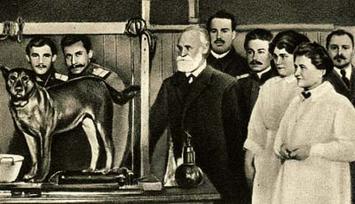 Why do smartphones and other technologies have such a pull on us? We all feel it nowadays. We clutch our smartphones as if they were a treasure we can’t lose. If you have watched The Lord of the Rings, our smartphones have a curious power over us, much like the One Ring. We can’t be apart from “our Precious.” In my previous blog, I discussed how one reason we are so drawn to tech, particularly smartphones, is because they provide easy ways to meet our psychological needs for competence, autonomy, and relatedness. Of course, our technologies have many benefits, but we seem to respond to them mindlessly and reflexively. Besides providing a gateway to meet our psychological needs, there are other mechanisms through which smartphones exert their pull on us. Classical conditioning and smartphones is one of those connections that keeps us reaching for our phones and disconnecting from the world around us.
Why do smartphones and other technologies have such a pull on us? We all feel it nowadays. We clutch our smartphones as if they were a treasure we can’t lose. If you have watched The Lord of the Rings, our smartphones have a curious power over us, much like the One Ring. We can’t be apart from “our Precious.” In my previous blog, I discussed how one reason we are so drawn to tech, particularly smartphones, is because they provide easy ways to meet our psychological needs for competence, autonomy, and relatedness. Of course, our technologies have many benefits, but we seem to respond to them mindlessly and reflexively. Besides providing a gateway to meet our psychological needs, there are other mechanisms through which smartphones exert their pull on us. Classical conditioning and smartphones is one of those connections that keeps us reaching for our phones and disconnecting from the world around us.
What Is Classical Conditioning?
If you have had an introductory psychology class, you probably read about Russian physiologist Ivan Pavlov. He was the first to explain classical conditioning, which is a type of associative learning. In his landmark research, Pavlov was able to train dogs to associate the sound of a metronome with the subsequent presentation of food. After repeatedly pairing the two, the dogs would salivate at the sound of the metronome. In fact, just the sight of the metronome would lead to salivation!
If you’ve had a cat or dog as a pet, you’ve probably seen this yourself. When I was growing up, we had cats and fed them canned food. The sound of the electric can opener would bring them running. Annoyingly, this happened practically every time we opened a can! The cats were often disappointed to find that the Campbell’s soup was not for them.
Classical Conditioning in Daily Life
Classical conditioning isn’t only for the dogs. Human behavior is influenced quite a bit through classical conditioning processes. Once these associations are made, we respond reflexively. So, our behavior is influenced but we aren’t even aware of it. The advertising industry uses classical conditioning principles to get us to buy their products. For instance, when they pair beautiful, scantily clad women with a sports car, they are trying to get their target audience, usually men, to associate the car with the sexual arousal elicited by the women. Thus, when the men see (or think about) a particular sports car, their hearts will race. The excitement brought by the women is misattributed to the car. The men are unconsciously drawn to purchasing the car to obtain that excitement.
Classical Conditioning and Smartphones
Classical conditioning and smartphones make a powerful combination. Smartphones are associated with ways to meet our psychological needs for competence, autonomy, and relatedness. We can connect with other people as well as gain access to endless forms of information, news, knowledge, and entertainment. Because these have been repeatedly paired, the sounds of our smartphones elicit automatic, reflexive responses. Have you ever been around when someone’s smartphone rings with the same chime as yours? Did you reflexively reach for your own smartphone? That’s classical conditioning in action. Through what’s known as second order conditioning, the sight of a smartphone now elicits a motivation to check it.
Because smartphones represent a gateway to meet our psychological needs, we are typically in a state of continuous partial attention. If we think of our brains in terms of a computer, part of our RAM (random access memory) is allocated to the smartphone. We are thinking about them constantly but usually not consciously. We pay unconscious attention to them, particularly when they buzz, ring, or are just in view.
The Problem Caused by Classical Conditioning
We are on constant alert because of our smartphones. They siphon away our attention from the people in our presence and the tasks at hand. Importantly, this appears to have a negative impact on both our relationships and cognitive functioning. The mere presence of smartphones, even when turned off or silenced, has been found to diminish the quality of in-person interactions. Similarly, the presence of smartphones, even when turned off or silenced, decreases brain power. These findings can be explained, at least in part, through classical conditioning mechanisms. Our attention is a limited resource. Because smartphones have been associated with meeting our needs (and desires) through classical conditioning, part of our attention is allocated to them when they are around. Consequently, we have less attention to direct toward the people in our presence or the task at hand.
The Takeaway?
Smartphones and other technologies exert a powerful influence on us. It is often irresistible. Classical conditioning and smartphones are a formidable combination. Although we like to think of ourselves as more evolved than most animals, the truth is that learning processes, such as classical conditioning, can affect our behavior in much the same way as Pavlov’s dogs. Since our smartphones are literally and figuratively always on hand, they quietly leach our attention away from the people in our presence and the world around. Although technologies promise greater connection and productivity, they often end up doing just the opposite. Unfortunately, we are largely unaware of this as I will discuss in my next blog.

